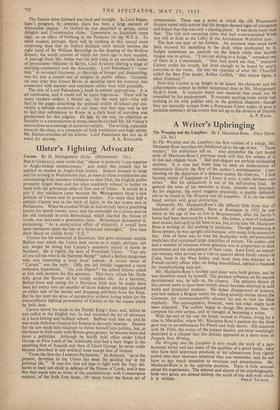A Writer's Upbringing
IN The Weeping and the Laughter,- the first volume of a trilogy, Mr. Maclaren-Ross describes his childhood up to the age often. "Those readers," his publishers tell us, " who remember the curt brutal style of Maclaren-Ross's previous work will find few echoes of it in this sad, elegant book." Sad and elegant are perhaps misleading epithets. It is • true that from time to time an undercurrent of melancholy disturbs the flow of the author's reminiscences. Com- menting on the departure of a detested nanny, he observes, " I first became aware of happiness as I know it now, a calm between two crises." But his melancholy is not of the self-pitying kind. In general the tone of his memoirs is lively, amused and detached. As for elegance, the word suggests preciosity, a quality definitely not to be found in The Weeping and the Laughter. It is, on the other hand, written with great distinction.
Outwardly Mr. Maclaren7Ross's life differed little from that of hundreds ' of other children. Born at Ramsgate in 1912, he was taken at the age of five to live in Bournemouth, after his family's home had been destroyed by a bomb. His father, a man of indepen- dent means, had early in life been to sea, but, at the time Mr. Maclaren- Ross is writing of, did nothing in particular. Though possessing a fierce temper, he was upright and humane, with many little eccentrici- ties. One of these was to cure his headaches with self-prescribed medicines that contained large quantities of poison. The author also had a number of relations whose glamour was in proportion to their remoteness and the infrequency of their visits. Aunt Enid, an imperi- ous woman, who arrived on a visit to quarrel about family estates in Cuba, lived in the West Indies, and Aunt Jane was married to a French cavalry officer who, on being demobilised, opened a business for manufacturing hair-dye.
Mr. Maclaren-Ross's brother and sister were both grown, and he was therefore much by himself. The greatest influence on his mental development was, he tells us, the cinema. The pictures shown at this period seem to have been mostly about heroines disolved in acid baths and homicidal maniacs. His father disapproved of horrors, and had sacked a Belgian nanny for telling atrocity stories about the Germans, yet incomprehensibly allowed his son to visit the films regularly. The consequences, however, were not what might have been expected. The author began to design film posters, then to compose his own scripts, and so thought of becoming a writer, With the end of the war the family moved to France, living for a time in Marseilles, where Mr. Maclaren-Ross's passion for the films gave way to an enthusiasm for Punch and Judy shows. His relations with M. Felix, the owner of the puppet theatre, are most touchingly described in a chapter that has already appeared as a short story in Penguin New Writing.
The Weeping and the Laughter is very much the work of a No- fessional writer and has many of the qualities of a good novel. Men who have held important positions or led adventurous lives rightly crowd into their memoirs whatever they can remember, and do not have to pay much attention to structure and presentation. Mr. Maclaren-Ross is in the opposite position. There is little unusual about his experiences. The interest and charm of his autobiography, both very great, are almost entirely the result of the skill with which


































 Previous page
Previous page